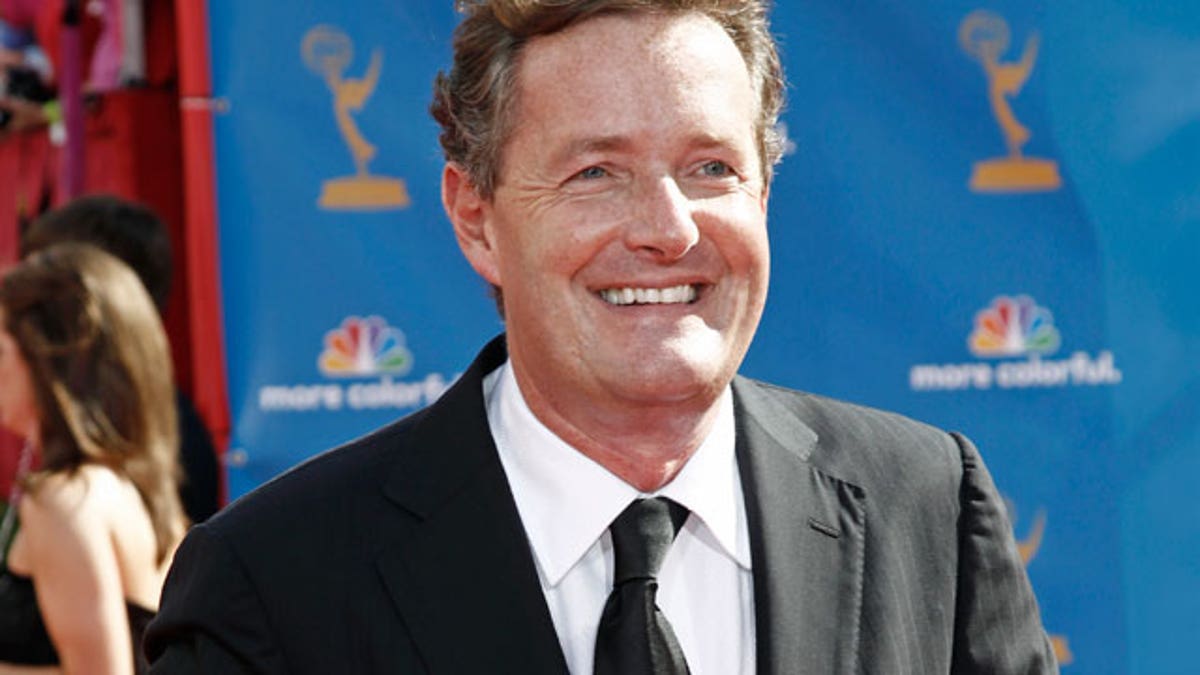
Piers Morgan will appear via videolink to speak about the phone-hacking scandal.
LONDON – CNN star Piers Morgan may be known to Americans as an empathetic English interviewer, but it's his past at the heart of Britain's troubled tabloid newspaper world that is being trotted out before the cameras this week.
The often colorful and sometimes controversial story of Morgan's rise to the top will be revisited Tuesday, when the former editor appears by videolink at a judge-led inquiry into the ethics and practices of Britain's scandal-tarred press.
His appearance has been widely anticipated -- not least because of the 46-year-old's irreverent flippancy.
"So heartwarming that everyone in U.K.'s missing me so much they want me to come home," he joked earlier this year amid demands he return to give evidence to the inquiry, set up by Prime Minister David Cameron following the disclosure that the now-defunct News of the World tabloid had for years illegally eavesdropped on the voice mail messages of public figures.
Actors Hugh Grant and Sienna Miller, Harry Potter author J.K. Rowling and singer Charlotte Church are among those who have given evidence about press abuse, while executives and lawyers for Murdoch's News Corp. have defended the newspaper.
Morgan shot to national prominence when he was picked by Murdoch to run the News of the World at age 28. Under his tenure the tabloid exposed actor Hugh Grant's liaison with Hollywood prostitute Divine Brown and Princess Diana's late-night phone calls to married art dealer Oliver Hoare. It wasn't all down to good reporting: Morgan has acknowledged he kept his edge in part through bribes paid to informants on rival titles.
In 1995 Morgan left the News of the World for the Daily Mirror. His time there was marked by scoops and controversy, but his editorship ended in 2004 when he ran a faked photograph purporting to show a British soldier urinating on an Iraqi detainee.
Morgan won a second life as a TV personality, eventually signing on as a judge of "America's Got Talent" and taking Larry King's old spot at CNN. So far, he's prospered. Ratings for "Piers Morgan Tonight" have been up 9 percent on last year's figures -- good if not spectacular -- and he appears to be reaching a younger audience.
CNN spokeswoman Barbara Levin said the network was "extremely pleased" with how Morgan's program was performing and the company has so far stood by its star even as the scandal over widespread phone hacking at the News of the World threatens to draw him in
Skeletons have already begun peeking out of the closet.
Critics have been picking through old interviews and his autobiography "The Insider," in which Morgan makes clear he knew of phone hacking as long ago as 2001.
Interviewed by supermodel Naomi Campbell for GQ magazine before the scandal over the practice boiled over, Morgan said he couldn't get too upset over hacking because "loads of newspaper journalists were doing it."
In an earlier interview for BBC radio unearthed by one of his critics, Morgan appeared to go further, saying it was difficult to condemn private eyes hired to hack into people's phones "because obviously you were running the results of their work."
The "you" in his statement could be interpreted in different ways. Morgan insists he wasn't talking about himself but instead making "a general observation about tabloid newspaper reporters and private investigators."
Morgan maintains that he has never hacked a phone, ordered anyone to hack a phone, or knowingly run a story based on an illegally intercepted message.
But the denial is hard to square with a 2006 article in which he said he'd been played a phone message former Beatle Paul McCartney left for his now ex-wife Heather Mills in the wake of one of their fights.
"It was heartbreaking," Morgan wrote of the tape, saying that McCartney "sounded lonely, miserable and desperate, and even sang 'We Can Work It Out' into the answerphone."
How did Morgan come to hear the tape? He's refused to say, but Mills told the BBC in August that "there was absolutely no honest way" he could have obtained the recording. McCartney echoed her sentiment, saying he'd apparently been hacked.
Morgan's book abounds with tantalizing references to questionably obtained material: There's "a dodgy transcript of a phone conversation," a celebrity's stolen laptop, or -- in one of the more revealing exchanges -- actress Kate Winslet's personal details.
"Someone had got hold of her mobile phone number," Morgan wrote. "I never like to ask how."
When Winslet demanded to know how Morgan got her number, which she had only just changed, Morgan shrugged it off.
"Look, Kate," he joked, "You don't get to be the editor of the Mirror without being a fairly despicable human being."
